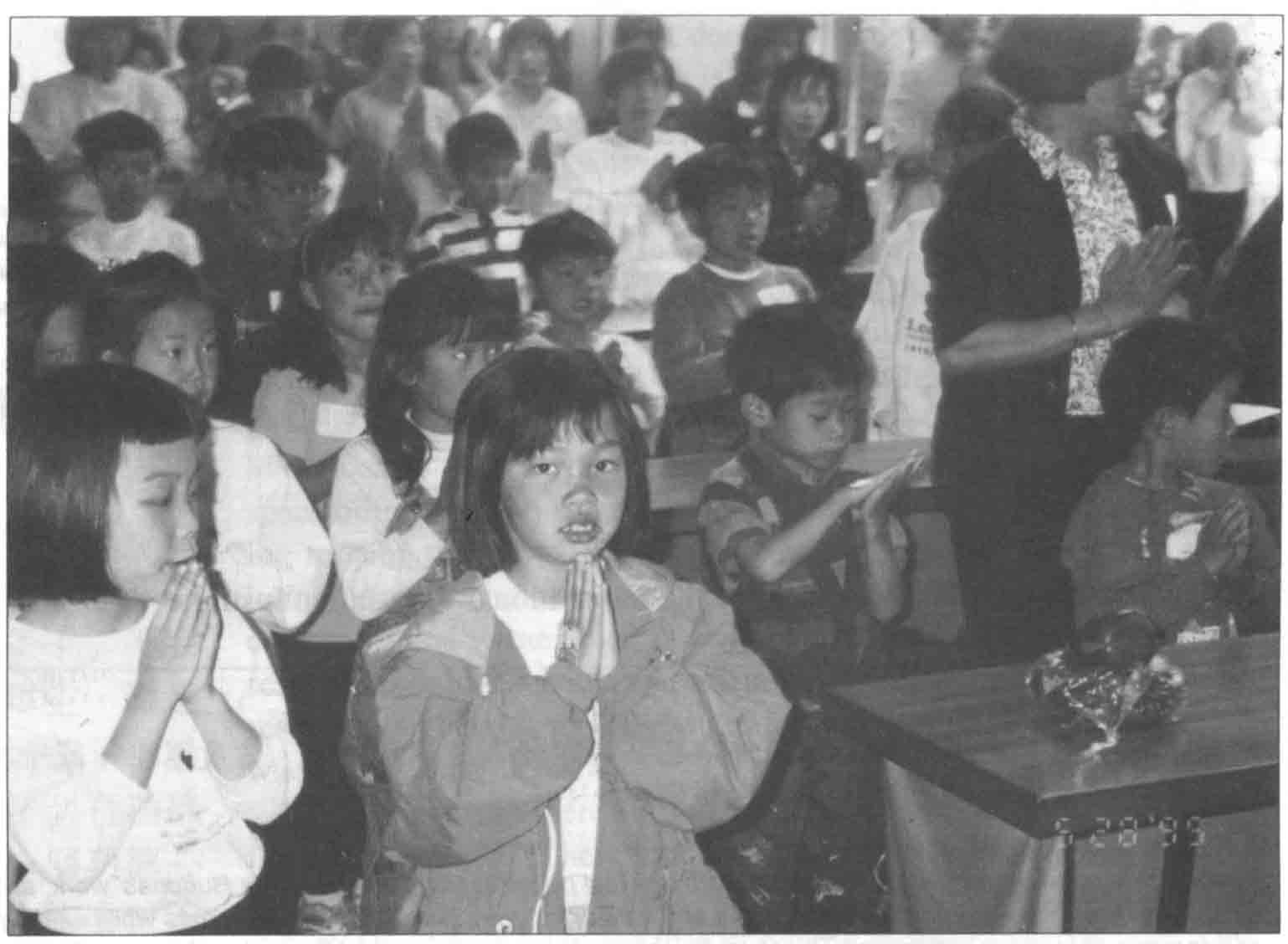前期提示:六波羅蜜又有三種的講法:第一種就是對治,第二就是相生,第三就是果報。
 |
| ■布施波羅蜜The Paramita of Giving |
再講這個布施波羅蜜有十種的利益,什麼是十種利益呢?第一種利益,它能降伏慳貪的煩惱。你這個慳貪,是一種煩惱,很不容易降伏的,必須要用這個布施,可以把這個慳貪的煩惱降伏了,這是第一種利益。
第二種利益是什麼呢?捨心相續。你這個捨,若是你前念想要捨,後念又不捨了,這談不到捨;你必須要念念都有這個捨心,有這個布施心。相續,就是接連不斷的,也就是繼續––接連不斷、不停止。這第二種利益,你真行布施,這個捨心就會相續。
第三種的利益,你和一切眾生平均這個財產,和一切眾生都沒有什麼分別,因為你的錢,可以布施給其他人,那麼大家都互通有無了。
第四種的利益,就生富貴家,你能生到富貴的家裡去。
第五種的利益,你生生都是施心現前,這個施,就是布施的心,不是說自私那個心。生生世世都有這個布施心,都能發這個布施心,這是第五種的利益。
第六種的利益,四眾愛樂。這個比丘僧,比丘尼,都歡喜你,為什麼呢?你可以布施給他;優婆塞、優婆夷也歡喜你,這叫四眾愛樂。
第七種的利益,處眾不怯畏。怎麼叫處眾不怯畏?你若是沒有德行的人,你遇著很多人,你不是怕這個,就是怕那個,看見這一個,「啊!這一個!他太有德行了」,你也怕他;看見那一個,「哦!他太兇了!太惡了!」你也怕他。他善,你也怕;惡,你也怕。你若有做布施,就是善也不怕,惡也不怕,這叫處眾不怯畏。
第八種的利益,勝名遍佈。你若布施,人人都知道你是個大富長者,你的好名譽誰都知道。
第九種的利益,這是很奇怪的,什麼呢?
手足柔軟。手也很棉軟的,好像棉花那樣子,啊!好柔滑的。不像那種粗人的手腳,喔!很粗的,你摸到他這個手上,就好像摸到那個鐵砂子上那麼硬。這第九是手足柔軟,手軟如棉,這個手像棉花似的,所以佛手才叫兜羅棉手嘛!這都是生生世世布施得到的相好。
第十種的利益更好,什麼呢?你要是到你所到的那個道場,就能遇著真正的善知識。你遇不著真正善知識,就是你在前生沒有做布施。你若能遇到真正的善知識,來用這苦口婆心。苦口,就是你不願意聽的,他也專門說你不願意聽的話,他口很苦的,你聽他說的話,對你好像很苦似的;婆心,但是他心裡是一種慈悲心,這是常常遇著善知識。
你能布施,就得到這十種的利益。那麼其餘五種的波羅蜜,也是每一個波羅蜜都有十種的利益。
待續 |
|
From last issue: There are three other ways to explain the Six Perfections: the first is in terms of their curing powers,
The second is how they interact, and the third is in terms of their rewards.
Now we'll talk about how the Paramita of Giving has ten kinds of advantages. What are the ten? The first advantage is that one will be able to conquer the afflictions associated with stinginess. If you have stinginess, that's a form of affliction which is hard to overcome. To overcome stinginess, you must engage in the practice of giving. That's the first advantage.
What is the second advantage? One will be able to sustain the thought of giving continuously. If your first thought is to give, but in your next thought you no longer want to give, that cannot be considered giving. You must have the wish to give, to practice charity, in thought after thought. You have to sustain this wish continuously, without a break and without stopping. This is the second advantage: If you truly practice giving, the thought of giving will be sustained continuously.
The third advantage is that one will be able to equally share one's wealth with all living beings, so that there is no discrimination between oneself and all living beings. Since you are able to give your money to others, everyone will be the same in what they have or don't have.
The fourth advantage is that one will be born in a wealthy and honorable family.
The fifth advantage is that in every life, one will be generous and ready to give. You will have generous, not selfish, inclinations. In life after life you always have the wish to give; you always bring forth the resolve to practice charity. This is the fifth kind of advantage.
The sixth advantage is that the four assemblies will take delight in one's presence. The Bhikshus and Bhikshunis are pleased with you. Why? Because you make offerings to them. The Upasakas and Upasikas are also happy with you. Thus the four assemblies are all delighted with you.
The seventh advantage is that one will not be afraid in a crowd. What does this mean? If you lack virtuous conduct, then when you encounter many people, if you are not afraid of one, you'll be afraid of another. When you see one person, you think, "Oh! This person has too much virtue--I'm afraid of him." When you see another person, you think, "Oh, he's so mean and evil!" and you're afraid of him as well. If someone is good, you're afraid of him; if he's evil, you're also scared. If you practice giving, then you fear neither good people nor evil people. Thus you will remain unafraid when surrounded by the multitudes.
The eighth advantage is that one's good reputation will become widespread. If you practice giving, everyone will know that you are a great, wealthy elder, and your good reputation will be known by all.
The ninth advantage is rather strange: one's hands and feet will be soft and supple. Your hands will be as soft as cotton and very smooth. They won't be coarse like the palms and soles of a person who does rough work; if you were to feel his hands, they would be as coarse as sandpaper.
The ninth advantage is to have soft and supple hands and feet; your hands will be as soft as cotton. The Buddhas' hands are called tula cotton hands. This is the special characteristic that comes from having practiced giving in life after life.
The tenth advantage is even better--what is it? When you reach the Bodhimanda that you are going to, you will meet a genuine Good and Wise Advisor. If you are unable to meet a true spiritual teacher, it is because you failed to practice giving in your previous lives. If you encounter a true spiritual teacher, he will use "earnest remonstrations and a kindly heart." Earnest remonstrations means he will make a point of saying things that you don't want to hear. His words are bitter; when you listen to them, they seem very bitter to you. A kindly heart means that he has a heart of compassion. This is the advantage of always encountering Good and Wise Advisors.
If one can practice giving, one will obtain these ten advantages. The remaining five Paramitas also have ten advantages associated with each of them.
To be continued |